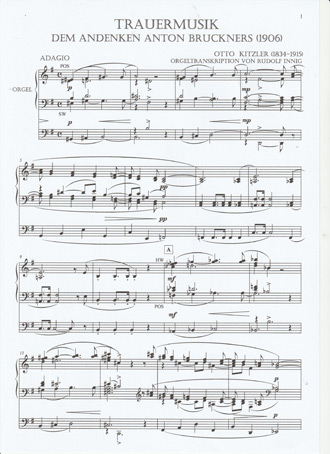Otto Kitzler – Funeral Music – In memory of Anton Bruckner


(16 pages, 10 €)
Very little is known about Otto Kitzler (1834-1915), the Linz theater conductor, who gave his ten years older 'student' Anton Bruckner the decisive impulses for the composition of symphonic orchestral works between November 1861 and the summer of 1863. The Kitzler Study Book, published in 2014, traces Bruckner's almost two years of instruction in 'free composition' with Otto Kitzler on 326 pages with his handwritten exercises, sketches and compositions.
Otto Kitzler was fascinated by Richard Wagner in his youth in Dresden, ever since he had seen him conducting the performance of Ludwig van Beethoven's Ninth Symphony in D major op. 125 as a choirboy in the Royal Saxon Court Orchestra Institute (the counterpart to the Leipzig Thomanerchor) in 1846.
After studying the cello in Brussels and Prague, he got to know and appreciate Wagner's operas as a cellist at the theaters in Strasbourg, Troyes, Paris and Lyon. In the autumn of 1858 he began his conducting career as second conductor at the theaters in Linz and Königsberg and returned to Linz in 1861 as first conductor.
His further path then took him to Temesvár and Hermannstadt (now Sibiu) in 1863, before he found a permanent position as theater conductor and director of the local music association in Brünn (now Brno) in 1868.
Kitzler's three-part funeral music - In memory of Anton Bruckner (Adagio - Andante con moto - Adagio) does not use direct quotations from Bruckner's symphonic works, but adopts typical stylistic elements of Bruckner's symphonic music: short 'impulse motifs' with their tendency towards sequencing (instead of motivic-thematic work), the advanced alteration harmony (inspired by Wagner) with a preference for fallacious turns in distant third relationships as well as the tendency towards pedal points or general rests, techniques that the gifted improviser on the organ Anton Bruckner had been familiar with since his youth.
(Dr. Rudolf Innig)

